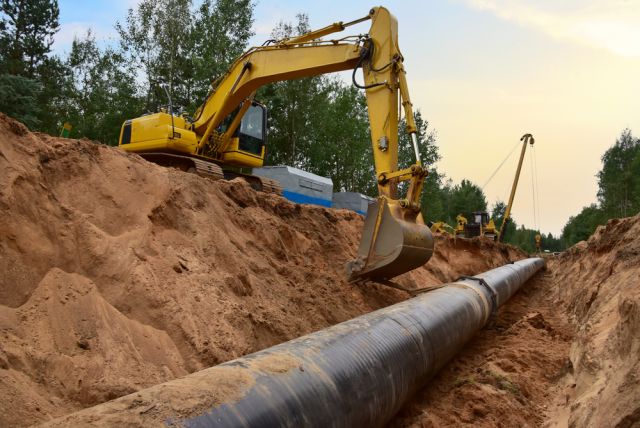
Kinder Morgan is planning for a need for further Permian pipeline expansion in the back half of the decade. (Source: Shutterstock)
Kinder Morgan is considering plans to expand its Gulf Coast Express (GCX) pipeline in the near future—in time to meet the customer needs for the latter part of the 2020s.
“We think there is going to be a need for further Permian egress in the back half of the decade,” said KMI CEO Kim Dang during the company’s earnings call on Jan. 17. “We think we are well positioned for that.”
The GCX is a 500-mile pipeline system currently hauling up to 2 Bcf/d in natural gas from the Permian Basin to the Agua Dulce area close to Corpus Christi, Texas. Producers based in the Permian expect to see demand for natural gas increase dramatically as LNG export terminals currently under construction along the Gulf Coast come online starting in 2025.
KMI leaders told investors the company needed to decide on a possible expansion soon.
“When we think about the need for the capacity, we say back half of the decade, but what we’re hearing from our customers is probably late ‘26, early ‘27,” said KMI CFO David Michaels. “Clearly, we’re in a competitive environment here. I won’t go through a lot of details, but something probably needs to be actioned here in the next couple of quarters to be able to meet that timeline.”
Michaels said the scale of the expansion still needs to be determined.
The company currently sees a rapidly growing market and is therefore positioning itself with projects to take advantage of it, said Rich Kinder, KMI executive chairman.
“I think it’s hard for people to realize exactly how extensive this is in Texas, Louisiana, but every time we put more gas into the system, it brings the opportunity to expand further downstream,” Kinder said. “That's a big reason why Kim has said repeatedly that, on our expansion capex target, we think we’ll be at the upper end of that range, from $1 billion to $2 billion.”
The company spent much of 2023 positioning itself for an expanding natural gas market, including a $1.8 billion acquisition of NextEra’s pipeline assets in South Texas.
The U.S. natural gas market expanded in 2023, but not enough to keep up with growing supply. In its weekly report, the U.S Energy Information Administration (EIA) found that natural gas storage for the week ended Jan. 12 was 3.182 Tcf, well above the five-year average of 2.862 Tcf. The cold snap that hit the country the following weekend was expected to set records for natural gas demand, but was not expected to have a large overall effect on the natural gas supply, the EIA said.
The continuing low price of gas bit into KMI’s overall profits for the final quarter of 2023. The company reported earnings of 28 cents per share on an adjusted basis. Analysts had an average estimate of 30 cents, Reuters reported.
KMI said profits from its NGLs and CO₂ segments were down versus the fourth quarter of 2022, due to dropping CO₂ volumes, lower prices on liquids and higher interest rates. The company’s adjusted profits on its natural gas pipelines fell to $1.33 billion in the fourth quarter from $1.35 billion during the same period last year.
Kim said the company remained bullish for 2024 despite the drop in earnings.
“We expect really nice growth over ’23, with every business unit expected to contribute to incremental earnings,” she said.
Recommended Reading
Bakshani: Midstream Exhibiting M&A Fever Symptoms
2024-05-20 - East Daley Analytics identified several market factors in the midstream sector that point to further consolidation ahead.
Despite 2Q Earnings Miss, Kinder Morgan Plans Gas Capacity Growth
2024-07-18 - Kinder Morgan's second quarter earnings fell short of expectations due to recent low gas prices, but remains bullish on natural gas demand and is moving ahead on projects in the Southeast U.S. and Williston Basin.
KC Fed Survey: NatGas to Rise, but Not Enough for Profitability
2024-07-15 - The Kansas City Federal Reserve Bank’s energy survey saw activity decline in the second quarter as producers look to the back half of 2024 for natural gas prices to improve—but not enough to turn a profit.
Expanding Gas Processing Capacity May Increase Permian Crude
2024-05-31 - The development of gas processing plants and a pipeline opening in the Permian Basin are expected to give crude producers a boost in the second half of 2024.
Analysis: China Prioritizes LNG Regasification as European Demand Wanes
2024-06-12 - Lower European demand is being countered by a growing LNG market in Asia, according to GlobalData research.





